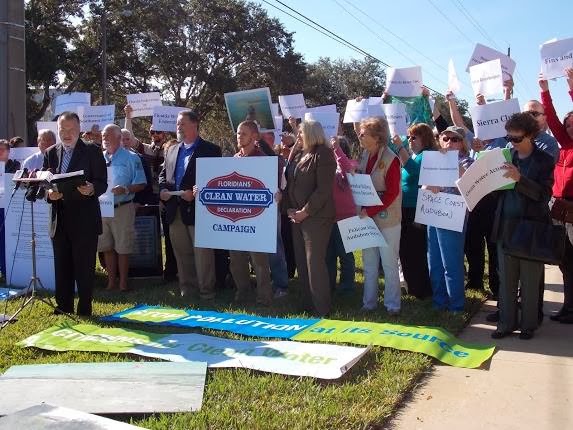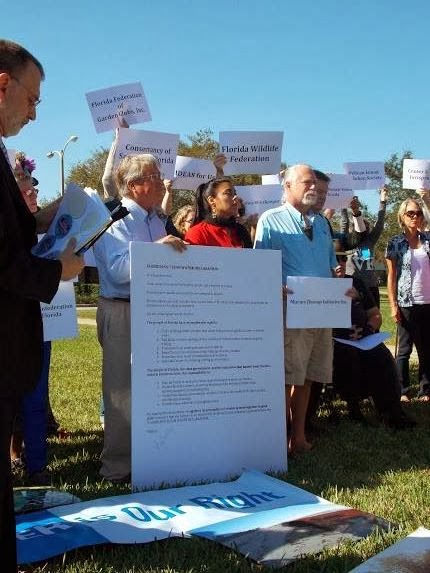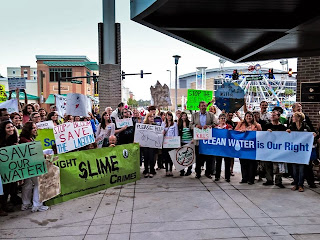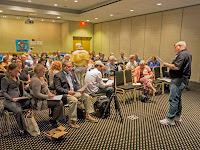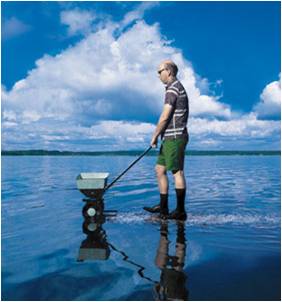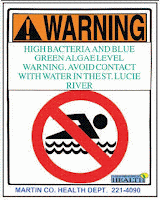Clean water advocates representing every corner
of the state came together on Thursday to announce the launch of the Floridians' Clean Water Declaration Campaign. The Declaration, signed by 50 organizations as of today ,
is a positive vision to inspire people to work together to find
solutions to Florida’s water quality and quantity problems and to send a clear
message to the state’s water managers that the people of Florida demand clean
water:
FLORIDIANS’ CLEAN WATER
DECLARATION
In
recognition that:
Clean
water is essential for healthy people and a healthy economy.
Florida
water quality and quantity are inseparably linked.
Florida
waters are held in public trust by the State of Florida for the benefit of its
people and the maintenance of natural ecosystems.
We
the undersigned hereby declare:
The people of Florida
have an inalienable right to:
1.
Clean
drinking water whether that water is drawn from public sources or private
wells.
2.
Safe
lakes, streams, springs, rivers, canals and coastal waters for swimming and
fishing.
3.
Protection
from water pollution and its effects.
4.
Know the sources of pollution that
threaten Florida’s waters.
5.
Protection from water privatization and its effects.
6.
Abundant
water for drinking, fishing and recreation.
The people of Florida, the state
government, and the industries that benefit from Florida’s natural resources
have the responsibility to:
1.
Stop
pollution at its source rather than allowing it to enter our waters.
2. Protect Florida’s waters, as well
as the people who depend on them, from overconsumption and privatization.
3. Protect the
natural environment which is critical to the health of
Florida's people, wildlife and economy.
4.
Provide
clean water for future generations.
By
signing this declaration, we agree to
its principles and resolve to work
together in good faith to ensure that the future of our waters will be
driven by the concepts contained within this FLORIDIANS’ CLEAN WATER
DECLARATION.
 The Campaign launches with a website and Facebook Page to reach out to Floridians of all stripes; individuals, businesses, organizations, and elected officials are asked to sign the declaration.
The Campaign launches with a website and Facebook Page to reach out to Floridians of all stripes; individuals, businesses, organizations, and elected officials are asked to sign the declaration.
The activists were joined by FL
Representative Linda Stewart (Orlando) who signed the declaration along with the
50 others at the announcement.
The crowd displayed signs
representing the participating organizations, photos of an array of
slime-choked waterways all over the state, banners reading “Stop Pollution at
its Source” and “I signed the Floridians’ Clean Water Declaration” stickers.
The declaration campaign is the
result of the Citizens’ Clean Water Summit held last November 16 where 253
activists representing 121 organizations and businesses came together to find a
way to work together more closely. A
collaborative planning committee of 19 organizations drafted the declaration to
reflect the state’s clean water advocates’ collective “bottom line” for
protecting Florida’s waters, wildlife and the health and livelihoods of the
people who depend on them.
"The sad fact is that Florida's polluters don't see
clean water as their responsibility, and our State Government lets them get
away with it. Florida needs to use the Clean Water Act to stop pollution
at its source, instead of waiting for toxic algae blooms to grow so large that
they kill our rivers, lakes and coastal estuaries. If Rick Scott's DEP
were to embrace and follow the principles in the Citizens Clean Water
Declaration, it would save taxpayers millions of dollars spent now to clean up
red tide and green slime when it becomes a crisis." said Frank
Jackalone, Sierra Club Senior Staff Manager.
Chuck O’Neal, Natural Resources
Chair of the league of Women Voters of Florida stated: “Our supply
of fresh water is in jeopardy. Our waterways are polluted with wastewater
and fertilizers. Our spring water is no longer healthy to drink. Our
population has doubled since 1980 and yet our water standards have not kept
pace with the growth. We need to protect our springs and our aquifer
before we lose this paradise for all of eternity. The goal of this campaign is to mobilize
enough citizens to let those who control water policy in this state know
that we demand protection of our waterways and our aquifer. Our voices
are growing stronger and our numbers are growing larger.”
Patrick Rose, an aquatic biologist and the Executive Director
of the Save the Manatee Club stated: “With this year’s catastrophic loss of
manatee lives the already difficult job to ensure the survival of the gentle
and defenseless manatees has been made all the more challenging, and it’s not
over yet. What we put into our waters, how much we pump from our aquifer
and draw from our springs and rivers, together with how we use our waterways,
all has an impact on our own lives and the lives of every aquatic
species. We must be better stewards of our waters and waterways or suffer
even more severe consequences going forward.”
The event was covered by the Orlando Sentinel, Univision, News 96.5, NPR affiliates, and The Ledger.
